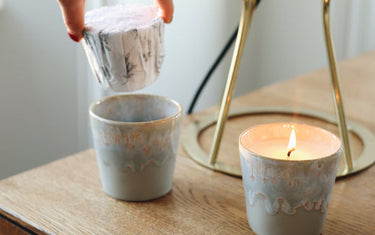2 min read / 24 April 2023 / Laura Garvin Gomez
Lemongrass Oil for Beekeeping
Looking for a chemical-free was to lure your bees into their new homes? Lemongrass oil may be just the thing you're after.
Share this post

Did you know that you can use essential oils to attract bees?
Lemongrass oil has been adopted by beekeepers for centuries to help maintain their hives in good working order.
A handy all-natural alternative to chemicals and contaminants, we're sharing some important tips on how to use lemongrass oil for bees and what they can help with.
Why use lemongrass oil for bees?
There are a few reasons why beekeepers might choose to use lemongrass essential oil in their hives. Some of the most beneficial include:
1. Avoiding the use of toxic chemicals
If you have no interest in causing harm to your bee friends, but still need to get them under control, lemongrass oil is an ideal way to calm your bees down without the use of harmful ingredients.
This is because lemongrass oil mimics the nasonov pheromone that queen bees produce, which is used to communicate with other bees about orientation and recruitment.
2. Attracting bee swarms into a new hive
Because the nasonov pheromone is so integral to the collective movement of bees, using lemongrass oil for bee swarms can help transport them into their new homes in a completely smoke-free way.
3. Controlling varroa mites
Varroa mites are a very common problem in hives during the late summer months. If not managed correctly, they can easily wipe out a hive in one quick sweep.
Thankfully, the use of lemongrass oil can control the growth of varroa mites and prevent them from spreading throughout the hive.
4. Discouraging mould formation
No one wants mould anywhere - especially not in areas where delicious honey is set to grow.
To keep your bees safe and their honey edible, use a few drops of anti-microbial lemongrass oil around the hive box to deter mould and mildew.

What's a good beehive recipe using lemongrass oil?
If you're looking to lure a swarm of bees into their new home, here's a good recipe to help get you started.
You will need:
- 2 tablespoons beeswax
- 1/4 cup olive oil
- 40 drops lemongrass essential oil
Directions:
- Using a tin can, make a double boiler.
- Melt the beeswax and olive oil together in the can over medium heat.
- Once fully melted, remove from the heat.
- Add your lemongrass oil. Stir into the mixture while it cools until you can see it thicken slightly.
- Pour into a separate tin and allow to cool.
To use:
- Smear a tablespoon of the mixture on the back of the hive box.
- Set the hive box in the shade, raised just above the ground.
- Wait for your bees to swarm.

Using lemongrass oil to lure swarming bees is much simpler than it seems, and you may just get lucky with how quickly they become attracted to the scent.
Remember to always wear the correct protective gear when working with bees and be sure to consult with a professional if you're unsure about any of the official processes.









